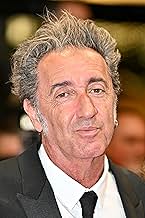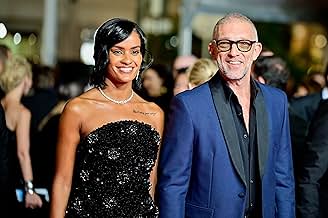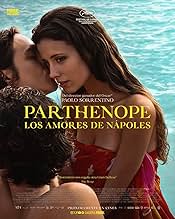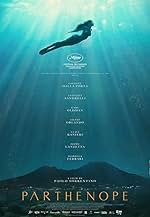Partenope ist eine Frau, die den Namen ihrer Stadt trägt. Ist sie eine Sirene oder ein Mythos?Partenope ist eine Frau, die den Namen ihrer Stadt trägt. Ist sie eine Sirene oder ein Mythos?Partenope ist eine Frau, die den Namen ihrer Stadt trägt. Ist sie eine Sirene oder ein Mythos?
- Regie
- Drehbuch
- Hauptbesetzung
- Auszeichnungen
- 7 Gewinne & 25 Nominierungen insgesamt
Antonio Annina
- Raimondo 10 anni
- (as Antonino Annina)
Maria Rosaria Bozzon
- Vecchia megera
- (as Mariarosaria Bozzon)
Zusammenfassung
Reviewers say 'Parthenope' by Paolo Sorrentino is visually stunning with breathtaking cinematography and beautiful Naples scenery. It explores themes of beauty, youth, love, and self-discovery. Celeste Dalla Porta's performance is praised for its allure and enigmatic quality. However, the film has mixed reviews, with some finding it pretentious and lacking substance, focusing too much on aesthetics. The narrative structure and character development are contentious, with some appreciating the philosophical approach and others finding it incoherent and shallow.
Empfohlene Bewertungen
Along the lines of the legendary beauty Aphrodite, "Parthenope" (Celeste Dalla Porta) was born in the sea and grew to become a great temptress to both of her male contemporaries. The first being her obsessed brother "Raimondo" (Daniele Rienzo) and the other her adoring childhood friend "Sandrino" (Dario Alta) whose unrequited love for her drove him to distraction. Not, however, to such distraction as that of her sibling, It's when the trio decide to head for an unfunded trip from their home in Naples to the nearby island of Capri that she meets elderly American writer/dipso "Cheever" (Gary Oldman) who finds her intriguing but appears to have a certain immunity to her charms and she's not used to that. Whilst on this carefree trip there befalls a tragic realisation that causes all of them to appreciate the stark realities and fickle shallowness of their lives and brings into focus senses of grief, rejection and emptiness. It's a beautifully photographed piece of cinema, this film, with sparing dialogue and a sexually, but not explicitly so, charged chemistry abundant throughout this rather visually extravagant but disappointingly soulless drama. It is a bit like a postcard upon which is a beautiful picture but just too few words to develop the characters or to quite put enough meat on their perfectly formed bones. Indeed as the second hour starts to drag, the whole thing begins to look more like a repetitively self-indulgent vanity exercise that might be rooted in mythology but that struggles to engage beyond the superficial. It's classy and stylish and well worth a look - but look appears to be all Paolo Sorrentino wants us to do.
I don't really know what to think of the film really. Is it a smack of Catholicism? Is it a tribute to Stephania Sandrelli? A tribute to the absurd, beauty, incest, intelligence? What irritated me the most was that there was a cigarette in almost every scene, as if it had the main role. Yes, at that time there was a lot of smoking, but is that really what you should focus on to show that era? I don't understand how it can be so important to show addiction in various forms in a film these days. It's the same in many films, even how they glorify drugs in the films that are made. Is this really so important to portray? Who should take responsibility for this? The screenwriters, the director or the actors? I think everyone should take responsibility for this and be able to say no to drug glorification. Applies to cigarettes, drugs and alcohol. That will be my assessment of the film. Take it or leave it.
The main issue with Parthenope is that it adds nothing new to Paolo Sorrentino's filmography. Too many familiar scenes, too many obsessions already portrayed, too many mannerisms endlessly repeated. While it's true that cigarettes have become a signature of the director, when every actor-from the beautiful lead to the extras in the background-keeps lighting one up, it quickly becomes cloying, if not outright ridiculous. I truly enjoy Sorrentino's cinema, but the excitement I felt leaving the theatre after watching The Consequences of Love is now only a faint memory, faded like the summer youth that once was.
Why would you watch this movie? Probably based on what we know that is said about Sorrentino and his perfect eye for the breathtaking visuals. Indeed, with the first shot in the movie he makes it clear - showing a carriage and the "Captain" floating on the sea with the view on the stunning coast of Napoli!
Not its beauty, but the Napoli itself is one of the key topics. If this city could be personified, it will definitely be a beautiful woman. Only, just like a person, Napoli is much more than a beauty and it definitely has its dark places.
It personally touched me that one of the key topics (and a key question) is also (what is) a study of Anthropology. Anthropology, formed of two Latin words, meaning a person and science. No other study could have been better for this movie, rather than a study of the most complicated being in this world. I will save you from spoilers and let you think of what Anthropology is before the movie answers it for you, but keep in mind that it is shown by the biggest "superpowers" of Parthenope and especially in her brother Raimondo, who in my opinion was the one that taught that to Parthenope.
The third matter that made me absolutely passionate about this movie was the precise choice of words and creation of dialogues. Her love interests were mostly people who had the most beautiful way of expressing their emotions. Listing to their dialogues made me feel like I've read a book.
I highly recommend watching this movie, although it may have some bizarre moments that can make you feel uneasy. But if you are open to understanding and accepting the strangeness, it will definitely let you "get carried away."
Not its beauty, but the Napoli itself is one of the key topics. If this city could be personified, it will definitely be a beautiful woman. Only, just like a person, Napoli is much more than a beauty and it definitely has its dark places.
It personally touched me that one of the key topics (and a key question) is also (what is) a study of Anthropology. Anthropology, formed of two Latin words, meaning a person and science. No other study could have been better for this movie, rather than a study of the most complicated being in this world. I will save you from spoilers and let you think of what Anthropology is before the movie answers it for you, but keep in mind that it is shown by the biggest "superpowers" of Parthenope and especially in her brother Raimondo, who in my opinion was the one that taught that to Parthenope.
The third matter that made me absolutely passionate about this movie was the precise choice of words and creation of dialogues. Her love interests were mostly people who had the most beautiful way of expressing their emotions. Listing to their dialogues made me feel like I've read a book.
I highly recommend watching this movie, although it may have some bizarre moments that can make you feel uneasy. But if you are open to understanding and accepting the strangeness, it will definitely let you "get carried away."
Somewhat disappointed by his last film È STATA LA MANO DI DIO, with PARTHENOPE I was reminded of what had touched me so much with the films of Sorrentino. Everything is beautiful, from the city of Naples and its pristine water to the yet unknown goddess Celeste da Porta. Add to it the Fellini-like shots and the wonderful jazz soundtrack by Lele Marchitelli : you get perfection.
The beauty of life in its insignificance... One might think he's making another GRANDE BELLEZZA, but it's just not the case. Sorrentino manages to surprise us once again, with a new way of dealing with what is - ultimately - the same topic.
The movie asks questions without ever answering them, as if to say that one should just stop looking for answers and start observing the beauty of the world for what it is. As a result, the spectator leaves the theater not with answers, but with an interesting take on life, and ultimately death...
Oh, and I almost forgot, the movie stars Gary Oldman. Though his onscreen time is limited, he manages to pull out a wonderful performance. He then withdraws, as if he were urging us to enjoy the movie he convinced us (by his presence in the cast) to go watch.
So I know not everybody is going to like it - some scenes are pretty weird I have to admit - but as far is I'm concerned, this movie gave me everything I did (and didn't) expect when stepping into the theater. Sincerely hope/think it will win Palme d'Or.
Grazie Paolo ;)
The beauty of life in its insignificance... One might think he's making another GRANDE BELLEZZA, but it's just not the case. Sorrentino manages to surprise us once again, with a new way of dealing with what is - ultimately - the same topic.
The movie asks questions without ever answering them, as if to say that one should just stop looking for answers and start observing the beauty of the world for what it is. As a result, the spectator leaves the theater not with answers, but with an interesting take on life, and ultimately death...
Oh, and I almost forgot, the movie stars Gary Oldman. Though his onscreen time is limited, he manages to pull out a wonderful performance. He then withdraws, as if he were urging us to enjoy the movie he convinced us (by his presence in the cast) to go watch.
So I know not everybody is going to like it - some scenes are pretty weird I have to admit - but as far is I'm concerned, this movie gave me everything I did (and didn't) expect when stepping into the theater. Sincerely hope/think it will win Palme d'Or.
Grazie Paolo ;)
Wusstest du schon
- WissenswertesPaolo Sorrentino said he reached out to Gary Oldman about filming a cameo after hearing that Oldman was a huge fan of his. Oldman immediately accepted saying Sorrentino was at the top of his wish list to collaborate with.
- Zitate
Devoto Marotta: It's very difficult to see, because it's the last thing you learn.
Parthenope: When do you learn to see?
Devoto Marotta: When everything else begins to be missing.
Parthenope: What is everything else?
Devoto Marotta: Love, youth, desire, emotion, pleasure.
- SoundtracksWarmth
Written by Peter Gregson
Performed by Peter Gregson, Warren Zielinski, Magdalena Filipczak, Laurie Anderson, Ashok Klouda
Top-Auswahl
Melde dich zum Bewerten an und greife auf die Watchlist für personalisierte Empfehlungen zu.
- How long is Parthenope?Powered by Alexa
Details
- Erscheinungsdatum
- Herkunftsländer
- Offizielle Standorte
- Sprachen
- Auch bekannt als
- Партенопа
- Drehorte
- Produktionsfirmen
- Weitere beteiligte Unternehmen bei IMDbPro anzeigen
Box Office
- Budget
- 26.300.000 € (geschätzt)
- Bruttoertrag in den USA und Kanada
- 289.303 $
- Eröffnungswochenende in den USA und in Kanada
- 31.588 $
- 9. Feb. 2025
- Weltweiter Bruttoertrag
- 11.651.125 $
- Laufzeit2 Stunden 17 Minuten
- Farbe
- Sound-Mix
- Seitenverhältnis
- 2.39 : 1
Zu dieser Seite beitragen
Bearbeitung vorschlagen oder fehlenden Inhalt hinzufügen


















